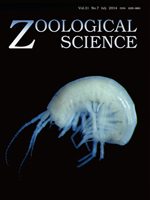Polyergus samurai, an obligatory social parasite ant, lacks the ability to perform usual colony tasks. It depends completely on host Formica japonica workers. In the mixed colony, arrhenotokous reproduction by host workers must be detrimental to the parasites. This study, conducted under artificial rearing conditions, investigated the behavioral influence by P. samurai worker on the production of host workers' male eggs. Host workers started laying eggs when the P. samurai queen was removed, but most eggs were destroyed by P. samurai workers. In a queenless condition, P. samurai workers showed frequent intraspecific dominance interactions, but few interspecific ones. After a short while the P. samurai worker started laying eggs, the F. japonica worker stopped laying eggs. The ovary had no mature oocyte. These results suggest that both the P. samurai queen and dominant workers can inhibit host workers' oviposition. A mesh experiment revealed that the dominant P. samurai workers were able to inhibit host workers' oviposition without contacts. The dominant workers and queens of P. samurai frequently received grooming and trophallaxis from host workers just as a host queen does, suggesting that the parasites secreted similar products to those of the host queen to inhibit the host workers' oviposition.
How to translate text using browser tools
1 July 2014
Regulation of Host Workers' Oviposition by the Social Parasite Ant Polyergus samurai
Yousuke Tsuneoka
ACCESS THE FULL ARTICLE

Zoological Science
Vol. 31 • No. 7
July 2014
Vol. 31 • No. 7
July 2014
Formica
oviposition
Polyergus
slave-making ant
worker reproduction




